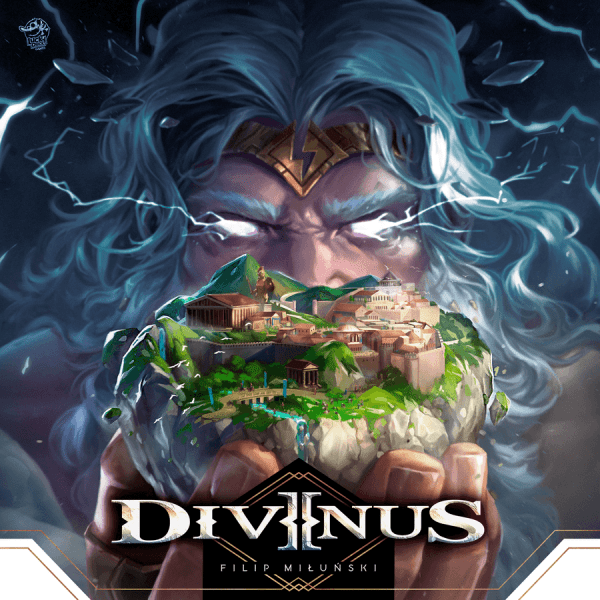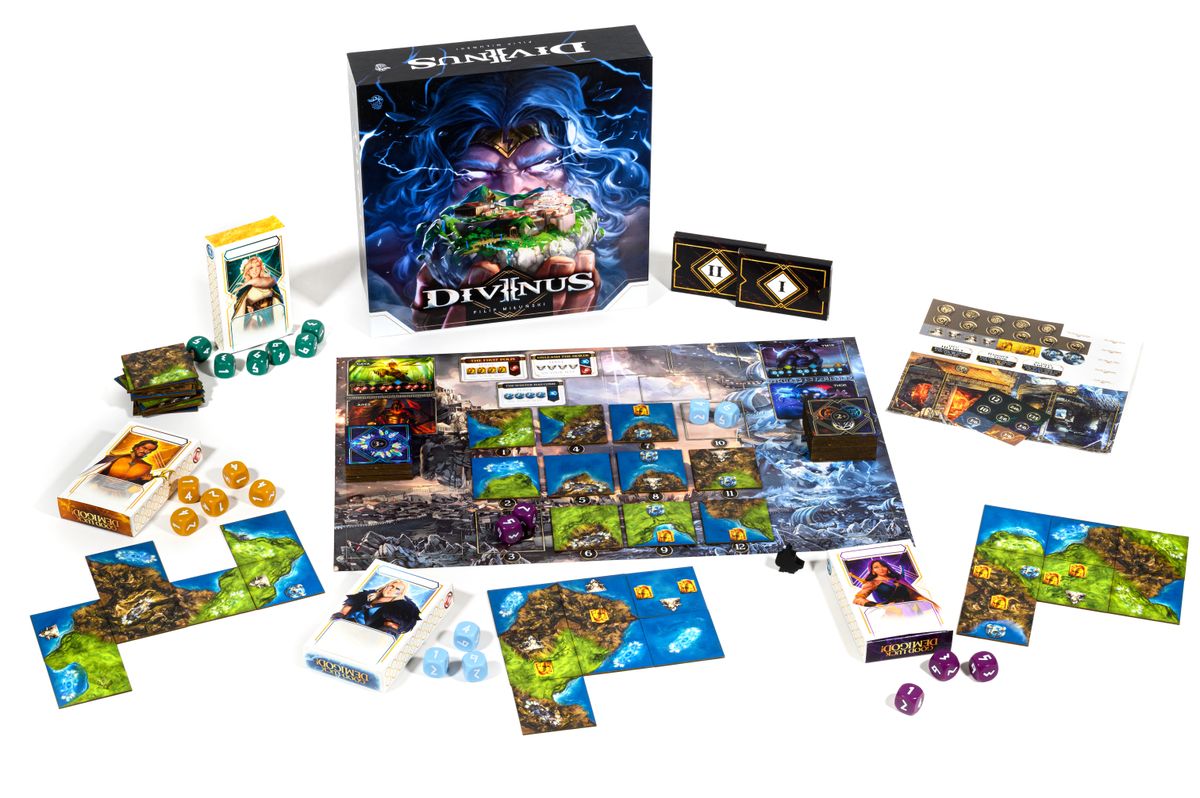Choose a God and Earn its Glory in Divinus

Lucky Duck Games introduces the latest in its app-integrated games, leveraging tile-laying and dice-rolling into a 45 minute (per game) casual legacy experience.
Gameplay
Divinus is a 2-4 player game that places players in the roles of demigods, who are working to earn favor among the competing Norse and Greek gods. Each player will choose a box representing one of the available demigods, and this will become their character through the rest of the game’s legacy campaign. The box will contain dice and be used to hold onto certain artifacts or catalog specific titles, changes, and updates as the game progresses. Using the app, Divinus will explain how to set up for the particular game about to be undertaken, with specific God cards, Quest cards, and even tiles being singled out for inclusion depending on the scenario and the consequences of the previous game.
During a turn, you will roll the dice and decide what to do with them. The most obvious is to purchase a terrain tile, as the goal is to build a personal 4-by-4 grid according to the goals specified by the God cards. These include having the most of one particular type or the largest mass of a terrain type, or a number of specific symbols that build favor toward one of the godly factions. These can change and grow (with the introduction of new gods) from game to game depending on how each scenario unfolds. As each game unfurls, new opportunities will arise for dice allocation that can benefit players.
To claim a tile, you can either add up the sum of dice or subtract values to reach the exact cost specified under each tile space. Then players will place their used dice in the space where the tiles were claimed and placed the tiles in their tableau. Players must match terrain types when placing, so just buying tiles without regard is an illegal move. Some tiles will have a symbol to be scanned, which will provide flavor text and potentially impact the story moving forward.
Once all dice have been used, players will perform the rest action to collect their dice, filling in the empty tile spaces with new tiles from one of the two face-down decks (again, outlined in the app’s recommended setup).
As play moves along, players will fulfill Quest and God objectives. When this occurs, players will use the app to input or scan the necessary information. This will result in scoring favor points for the Norse and/or Greek factions, as well as potential cumulative points.
Once the first player completes their grid, the game immediately stops. The app will help add up any points earned during the scenario, as well as provide subtext for the story and what will happen next. This may include earning titles, artifacts, and other goodies that will propel the story and the game forward during the next session.

Review
The word “legacy” incurs a hotbed of opinion and options in the current board gaming landscape. Most associate it with heavier gaming fare, but Divinus is a strong entry into the family and casual-friendly categories that are beginning to explore seasonal and legacy content. The gameplay is simple: roll some dice, collect some tiles, fulfil objectives, and occasionally find a new artifact or location that enhances options within the story. Perhaps you will add a few stickers to those items to spice up current and future plays through the story as well.
This could be a turn off to casual gamers who want to know what gameplay is going to be game to game, with the variation dependent solely on what tiles and quests are chosen at random. However, a game like Divinus works best because it offers random choices as the story progresses. Without the legacy aspect, Divinus would still be a fun, light game but miss that extra something to set it apart from like-minded games.
Removing all the bells and whistles, Divinus is a game that a family can still sink their teeth into, especially those who love larger-than-life stories involving old gods. Rolling dice and allocating them to complete quests, gain helpful items, and buy tiles to place in one’s 4-by-4 grid is easy to understand. The app makes picking up the game and playing it while learning the rules fairly easy (though there are some bugs with the app to still work out, this is still in the prototype phase).
The app integration works well and does a decent job unfurling its story of battling gods while advancing the story based on the outcome of each progressive scenario. But the theming, without this, also comes across in the game design itself but not with the same depth. Divinus is heavily reliant on the app, so this may be a turn-off for gamers looking to just pick up and play a game.
Overall, Divinus is not going to be for every casual gamer looking at tile-laying and dice-rolling games to play in 30-45 minutes. But for those who are curious about legacy content and looking for an entry point with an app-integrated assist, with mechanics that are familiar inside a creative theme, Divinus may be worth your time and attention.
Divinus is currently on crowdfunding site Gamefound.
Pros: Legacy gaming in a casual package, Easy to setup and learn, Fun narrative with a unique theme
Cons: Heavy app-integration and reliance, Winning and losing is not cut-and-dry, Legacy content requires undivided attention and continued progression




